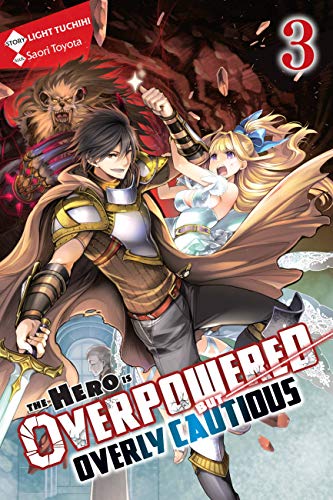By Light Tuchihi and Saori Toyota. Released in Japan as “Kono Yuusha Ga Ore TUEEE Kuse Ni Shinchou Sugiru” by Kadokawa Books. Released in North America by Yen On. Translated by Matt Rutsohn.
As I said last time, it’s been hard seeing this two-volume series continue into Volumes 3 and 4. The author knows they can’t just walk things back, but at the same time a different path forward is hard to take. For the most part in this fourth volume, Seiya is much the same as he always is – verbally trashing everyone and anyone while also creating the most perfectly prepared plans. We get a lot of that here as well. He abuses another God who’s hiding a dark secret that turns out to be more embarrassing than anything else. He distrusts almost everyone else around him, including the zombie general (who Rista is too weak to send to his eternal reward) and a machine person with the personality of a meek young girl. And of course Rista supposedly spends most of the book in ‘lower than a weed’ status, even though she’s gotten to the point where she no longer wonders why he does the things he does. That said, there’s a tiny bit here and there showing other sides to him.
This applies to Rista as well, who is not simply there to be a tsukkomi anymore (though when she is called upon, she does manage to step right back into the role – the scene with the giant Rista golem is the funniest in the entire book, and reminds you that above all this is still meant to be a comedy). She follows Seiya’s orders without questioning now. Unfortunately, she also wants to try to help in a way that is not simply following instructions, and that’s what leads to danger and trouble, as she ends up cursed by the villain simply because she took the initiative for once. (She also fails hard when meeting the God of Wealth, where her need for some way to help Seiya causes her to give in to their pyramid schemes even as she knows that’s what they are.) And she knows she needs to step up despite all this, because Seiya is clearly doing too much.
In the first half of the book, we see Seiya seemingly panicking, something egregiously out of character for him, and it turns out, unsurprisingly, to have been part of his plan all along. This makes the impact much greater in the climax of the book when he falls unconscious and turns out, yes, to be genuinely unconscious. (This leads to the second best joke of the book as well, when the instructions he leaves behind are a Choose-Your-Own-Adventure style manual for every possible problem.) The villain in the book isn’t as memorable as the last few, though I will grant that she is creepy, particularly when consuming her other selves. They do leave a nasty curse on Rista, and there’s a cliffhanger suggestion that tragedy awaits (though I’m not as convinced as Rista is that she is Seiya’s Most Important Person.)
The 2nd arc ends with the next book, and it might be a good point to see whether the series is one that I should continue or not. I’m still sort of on the fence. But till then, please enjoy giant Mega Rista.



